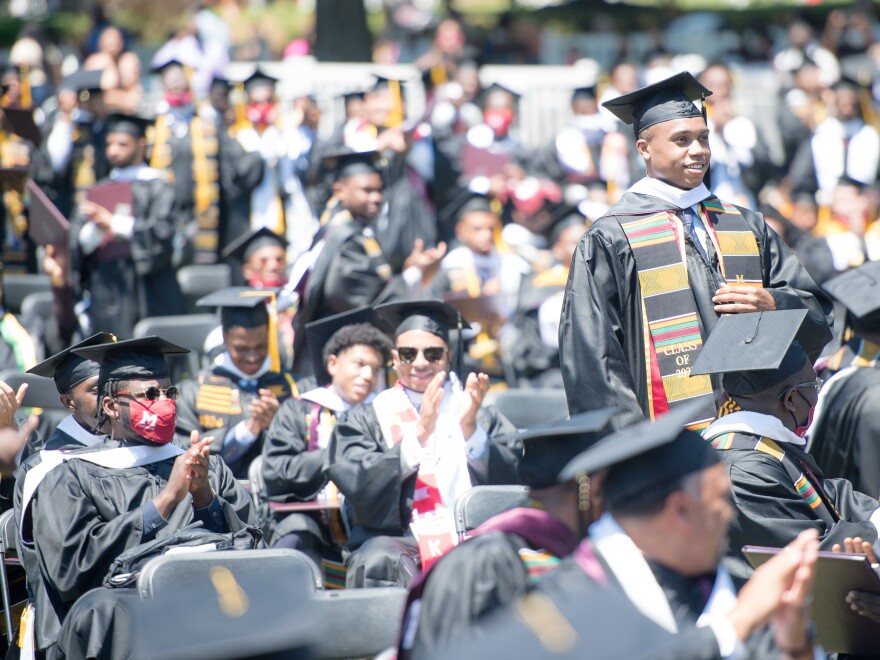Carrington Wigham thought it was a normal Monday.
She was wrapping up her junior year at Florida A&M University, a historically Black university in Tallahassee, Fla., and had signed on to her online student portal to register for classes for her last year of college — a process that she said on a normal day is stressful because she had to look into her remaining tuition balance.
On a normal day, she would see she owed the school $8,000. She'd call her mom and they would try to figure out how to pay, so Wigham could graduate on time.
But this Monday was not a normal day.
Wigham was one of 7,946 students at FAMU who had their tuition balance erased thanks to funds from the CARES Act that many historically Black colleges and universities have put directly toward student debts.
Her remaining balance on this very not normal Monday was $0.
Direct investment in students helps the school, too
The CARES Act, passed in March 2020, gave $1 billion to HBCUs and Minority Serving Institutions specifically. More than 20 of the roughly 100 HBCUs around the country have been using these funds to help their students pay off debts owed to the school.
"We started looking early on what we might do to support our students," Larry Robinson, president of Florida A&M University, told NPR.
At FAMU, more than 60% of students receive financial aid through federal Pell Grants and the average household income is less than $50,000 a year, Robinson said. Supporting students financially during the pandemic was a "natural" step.
Walter Kimbrough, president of Dillard University, an HBCU in New Orleans, said the process of HBCUs applying the funds directly to students' bills also benefits the university.
"What you end up having happen is the students will drop out because they can't pay the debt that they owe, then the school doesn't have that money that they budgeted for and that student might not come back, which lowers the graduation rate," Kimbrough told NPR.
"So for us, it makes a lot of sense because you can eliminate that debt so that the student can continue with their education and graduate," he said. "It's a win for everybody in this situation."
Low graduation rates, Kimbrough said, are a constant point of criticism toward HBCUs and the low rates are often directly tied to students not being able to afford their education.
"It is one of those challenges that money actually can fix it," he said.
Student debt impacts Black students differently
Data shows Black students take longer to pay off their debt than white students; they are also more likely to default on their loans. Additionally, Black graduates, on average, make less money than their white peers, even with a college degree. Canceling student debt, many advocates argue, is one of the fastest ways to close the Black-white wealth gap.
But Kimbrough also points out that for some HBCU students, having their tuition balances forgiven by their school isn't necessarily related to the burden Black students face in paying off their student debt after graduation.
He says the students who need the immediate financial help sometimes aren't able to get loans from a bank in the first place, given their current financial situation.
"These folks can't get their money, period," he said, "For these students, when there is a gap and they can't pay, they just don't finish school."
Wigham says she's noticed on campus when a student doesn't return the next semester.
"When I notice students who don't usually return from the semester, they're like, 'Oh, I wasn't able to register for classes because I had outstanding balance.' That is just so heartbreaking, but that is reality," she said. "That narrative is way too familiar for students across this country."
Students can look ahead with more hope
HBCU leaders like Robinson said more than anything, though, they hope helping students with their tuition balances shows how much HBCUs prioritize their students — and shows their students what it means to give back and care for people who are facing challenging times.
"We expect our students to be excellent while they're here and do great things when they leave, but that's not enough. ... They really have to leave here with an appreciation for those have haven't been as fortunate, those who are still struggling," Robinson said.
And for students like Wigham, it also provides a feeling that's hard to find when you're young and saddled with debt: hope.
"I am just so, so, so, so hopeful the future will be bright," Wigham said.
"Sometimes people feel like giving up, people feel discouraged but when little miracles like this happen, it's reassurance, for sure."
Copyright 2021 NPR. To see more, visit https://www.npr.org.






